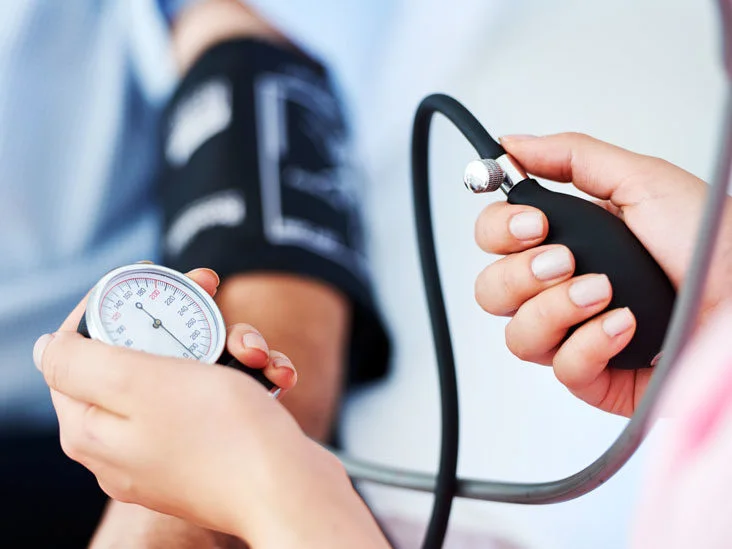Understanding Hypertension: The Silent Killer - Causes, Signs, and Treatment

What is Hypertension?
Hypertension is a chronic medical condition characterized by elevated blood pressure levels in the arteries. Blood pressure is the force exerted by the blood against the walls of the arteries as the heart pumps it around the body. A blood pressure reading consists of two numbers: systolic pressure (the top number) and diastolic pressure (the bottom number). Normal blood pressure is typically around 120/80 mmHg. When these numbers consistently rise above the normal range, it can lead to hypertension.
Causes of Hypertension:
1. Unhealthy Lifestyle: Poor dietary choices, lack of physical activity, excessive alcohol consumption, and tobacco use are some lifestyle factors that can contribute to hypertension. 2. Family History: Hypertension can have a genetic component, meaning individuals with a family history of high blood pressure are at a higher risk. 3. Age: As individuals age, the risk of developing hypertension increases, particularly after the age of 40. 4. Obesity: Excess body weight puts additional strain on the heart, leading to an increased likelihood of hypertension. 5. Stress: Chronic stress and anxiety can contribute to hypertension through various physiological mechanisms. 6. Underlying Medical Conditions:** Certain medical conditions, such as chronic kidney disease, hormonal disorders (e.g., Cushing's syndrome), and sleep apnea, can contribute to elevated blood pressure levels.
**Risks Associated with Hypertension:**
Uncontrolled hypertension can lead to severe health complications, making it crucial to address the condition promptly:
1. **Cardiovascular Disease:** Hypertension exerts additional strain on the heart, increasing the risk of heart attacks, heart failure, and abnormal heart rhythms.
2. **Stroke:** Elevated blood pressure damages blood vessels in the brain, heightening the likelihood of a stroke.
3. **Kidney Disease:** Hypertension can impair kidney function and lead to kidney damage over time.
4. **Vision Problems:** High blood pressure affects the blood vessels in the eyes, potentially leading to vision impairment or even blindness.
5. **Metabolic Disorders:** Hypertension is often associated with metabolic disorders such as diabetes and high cholesterol, increasing the risk of cardiovascular complications.
Signs and Symptoms:
Hypertension is often called the "silent killer" because it can remain asymptomatic for a long time. However, some individuals may experience:
1. Headaches
2. Dizziness
3. Shortness of breath
4. Chest pain
5. Vision problems
6. Fatigue
It is important to note that these symptoms can also be indicative of other medical conditions, so regular blood pressure check-ups are crucial for early detection.
**Managing and Preventing Hypertension:**
Thankfully, hypertension can be effectively managed and even prevented by making positive lifestyle changes:
1. **Balanced Diet:** Adopt a diet rich in fruits, vegetables, whole grains, lean proteins, and low-fat dairy products while minimizing salt and saturated fat intake. The DASH (Dietary Approaches to Stop Hypertension) diet is particularly recommended for individuals with hypertension.
2. **Regular Exercise:** Engage in at least 150 minutes of moderate-intensity aerobic exercise or 75 minutes of vigorous exercise per week. Physical activity helps lower blood pressure and contributes to overall cardiovascular health.
3. **Weight Management:** Maintain a healthy weight through a combination of regular exercise and a balanced diet. Weight loss, even as little as 5-10% of body weight, can significantly improve blood pressure.
4. **Limit Alcohol Intake:** Men should limit alcohol consumption to a maximum of two drinks per day, while women should consume no more than one drink per day.
5. **Quit Smoking:** Smoking increases blood pressure and damages blood vessels, making it vital to quit smoking to manage hypertension effectively.
6. **Stress Management:** Practice stress-reducing techniques such as meditation, deep breathing exercises, or engaging in hobbies that bring joy and relaxation to help lower blood pressure.
7. **Regular Check-ups:** Regularly monitor your blood pressure and consult with a healthcare provider for personalized advice and, if necessary, medication to control hypertension effectively.
**Understanding Hypertension Treatment:**
Hypertension, or high blood pressure, is a complex condition that requires a multifaceted approach to treatment. Our team at Oxford Hospital believes in a patient-centered approach, tailoring treatment plans to meet each individual's unique needs. The primary goals of hypertension treatment are to reduce blood pressure levels, prevent complications, and improve overall cardiovascular health.
**1. Lifestyle Modifications:*
One of the cornerstones of hypertension treatment is encouraging lifestyle changes that can significantly impact blood pressure levels. Our team, led by Dr. Gurbeer Gill, works closely with patients to implement the following modifications:
- **Dietary Adjustments:** We emphasize a well-balanced diet rich in fruits, vegetables, whole grains, lean proteins, and low-fat dairy products. We educate patients about reducing sodium and saturated fat intake, which helps in managing blood pressure.
- **Regular Exercise:** Physical activity is essential in controlling hypertension. Our expert team provides personalized exercise plans, encouraging patients to engage in aerobic activities, such as walking, swimming, or cycling, for at least 150 minutes per week.
- **Weight Management:** Achieving and maintaining a healthy weight is crucial for hypertension management. Our specialists guide patients on weight loss strategies, combining exercise and dietary modifications.
- **Stress Reduction:** Chronic stress can contribute to hypertension. Dr. Gurbeer Gill and our team educate patients on stress-reduction techniques, including meditation, deep breathing exercises, and relaxation techniques.
**2. Medication Management:**
While lifestyle modifications are vital, some patients may require medication to achieve optimal blood pressure control. At Oxford Hospital, our experienced medical team, including Dr. Gurbeer Gill, carefully evaluates each patient's medical history and blood pressure readings to determine the appropriate medications.
Commonly prescribed medications for hypertension include:
- **Diuretics:** These medications help the body eliminate excess sodium and water, reducing the volume of blood circulating through the blood vessels, thus lowering blood pressure.
- **ACE Inhibitors and ARBs:** These drugs relax blood vessels, making it easier for blood to flow through, and they also help lower blood pressure.
- **Beta-Blockers:** These medications reduce the heart's workload by slowing the heart rate and reducing the force of contraction.
- **Calcium Channel Blockers:** These drugs relax and widen blood vessels, improving blood flow and reducing blood pressure.
Our team closely monitors patients' responses to medication, making adjustments as needed to achieve optimal blood pressure control while minimizing side effects.
**3. Regular Follow-ups and Support:**
At Oxford Hospital, we prioritize continuity of care and provide ongoing support to our patients. Regular follow-up appointments with Dr. Gurbeer Gill and our team are scheduled to monitor progress, adjust treatment plans if necessary, and address any concerns or questions patients may have.
**Conclusion:**
At Oxford Hospital, the treatment of hypertension under the guidance of Dr. Gurbeer Gill is a comprehensive and patient-centered approach. By combining lifestyle modifications, medication management, and regular follow-ups, we strive to empower our patients to take control of their blood pressure and lead healthier lives.
If you or a loved one are dealing with hypertension, we encourage you to schedule a consultation with our expert team at Oxford Hospital. Together, we can create a personalized treatment plan to manage hypertension effectively and improve your overall cardiovascular health. Your well-being is our top priority, and we are here to support you on your journey to a healthier and happier life.





